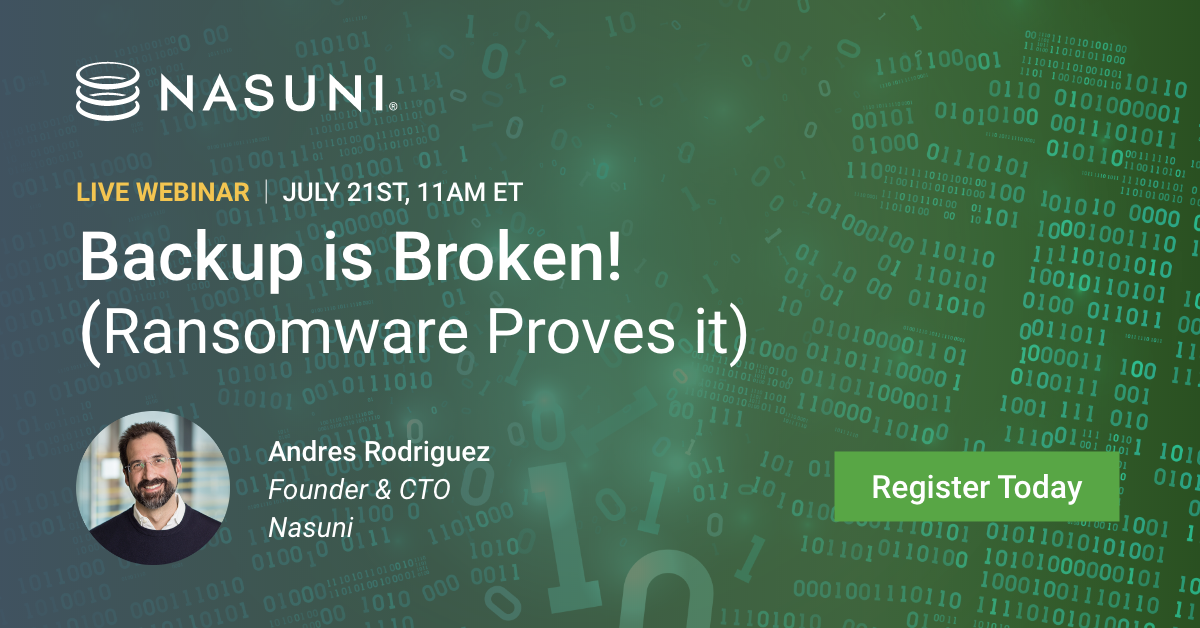Backup is Broken
May 26, 2021

File backup is broken and no one is talking about it. The most recent uptick in ransomware attacks has exposed a fallacy that the industry has been supporting and re-enforcing for decades. Large companies running modern backup software and following recommended best practices are being brought down to their knees for weeks by ransomware attacks. How is this happening?
All backup technology relies on a simple premise. You make a copy of the data in order to protect it. The restore phase — the reason we rely on backup in the first place — moves that copy back into production. If the production system is a VM or a database, then it doesn’t take that long to copy back the healthy data in order to recover. However, when we are talking about even a moderately sized, multi-terabyte file server, the restore operation can take hours or even days.
This limitation has nothing to do with any specific backup vendor technology. The problem is inherent to the entire approach, and the backup copy-back operation which is necessary in order to restore a file server. It takes a long time to rebuild a file server because — as anyone who has ever had to wait for a migration job to complete knows — it takes a long time to copy files to any file server.
The more files to copy, the more time you wait. Multiply that by the many file servers in a large organization that could be compromised by a full-blown, distributed ransomware attack. Now you are looking at a multi-week recovery effort that is pure IT Hell.
Backup protects your files, but it does not protect your business.
The alternative to file server backup is a file system versioning technology. Unlike backup, a versioned file system can use internal pointers to restore files back to previous, healthy versions of themselves. No data has to be copied back; hence, the restore operation is nearly instantaneous, no matter how many files need to be restored.
The problem with traditional, block-based, versioned file systems is that the number of versions are limited. This means that traditional versioning, or snapshots, can typically be used to unwind damage that has occurred only a few days back.
Hackers know this weak spot. So they wait. A well-executed ransomware attack is not unlike a WWII Wolfpack offensive. U-boats would lay under the surface, undetected, for days or weeks, tracking and surrounding Allied convoys before attacking. Similarly, hackers know that if their ransomware goes undetected for just a few days, operators will be forced to rely on backups in order to restore their file servers. They know that this will, in turn, extend the recovery window to such a point that it becomes smarter for the company to pay the ransom than to wait for restores to complete. The files are still protected by the backup, but they are useless. The business is out of time.
This is the hidden flaw in backup that hackers have become so adept at exploiting. Today’s ransomware attacks target dozens of file servers simultaneously, covering hundreds of terabytes, and go undetected for weeks. A modern, cloud-based versioned file system like UniFS® can recover from large-scale ransomware attacks without having to resort to backup, regardless of how long the attack goes undetected. Unlike traditional file systems, cloud-based systems have no limitations on the number of versions or how far back in time these versions can exist. Because the versions never need to be re-used, they are immutable, meaning no malicious attack can ever change the past. A cloud-based versioned file system is forever immutable and immediately recoverable. We know it works. Our customers remind us all the time.
Backup, on the other hand, doesn’t protect you against the long outage that results when you try to restore those files. It is a bad insurance policy against ransomware. At our user groups, we ask our customers to name their favorite thing about Nasuni. Again and again, the answer at the top the list is some variation of not having to do backups or not having to rely on backup or not having to wait for backups.
Backup is broken. Backing up files is bad for business. It is a Wile E. Coyote insurance policy. You feel fantastic, with your business running at full speed, until ransomware strikes and you realize you are way out there past the edge of the cliff, standing on air and spinning your legs.
Nasuni protects your files and your business. We can recover your files without backups, without delays and without giving hackers any leverage. We turn what might have been your worst day into an IT win and internal success story. And we do all of this at scale.
No surprises. No lies. That’s a real promise.